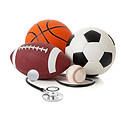
What We Offer
Before we push performance, we establish clear, measurable baselines—so you can move with purpose and reduce risk before it becomes reality.
Sports Physicals & Pre-Participation Exams (PPEs)
Required for youth and school sports in Colorado—ours go further.
-
Medical clearance + movement-based screening
-
Identifies red flags before activity starts
-
Ideal for middle school, high school, and club athletes
Brain Health Baseline Testing
Build a neurological reference point before any injury occurs.
-
Critical for athletes, first responders those who care about their health.
-
Supports safer concussion recovery
-
Helps monitor long-term cognitive health
-
Baseline testing protects more than performance—it protects you. These records serve as medical-legal documentation in case of an accident, ensuring you have the evidence needed to recover with confidence.
Movement Screening, Performance Readiness, & Return-to-Play Assessments
Not just for athletes—this is for anyone getting back into motion.
-
Perfect for seasonal sports, hiking, rucking, or new training plans
-
Identifies imbalances, risk factors, and mobility issues
-
Builds a safe foundation before loading your body
Common Questions

1
Who should get a brain assessment?
Protect Your Brain:
Proactive Assessments for High-Risk Groups. Children (ages 12-18), athletes, and seniors are particularly vulnerable to concussions and brain injuries. We strongly advise these individuals to undergo early brain assessments to establish baseline measurements. This crucial step allows healthcare professionals to accurately diagnose and track recovery from brain injuries. While targeted at high-risk groups, everyone can benefit from a comprehensive brain health evaluation—take action today to safeguard your well-being tomorrow.
2
How often should someone get a brain assessment?
Stay Ahead with Essential Brain Health Assessments:
If you experience a head injury or suspect neurological issues, immediate assessment is crucial. For contact and competitive sports participants, we recommend pre-season and inter-season evaluations to monitor brain health. High-risk groups, including children and seniors, should undergo annual assessments, while those at normal risk should consider evaluations every three years. Protect your neurological health with timely and regular assessments.
3
What happens if you find something wrong?
Comprehensive Health Reports and Personalized Care Plans: Our detailed reports outline your results across optimal, healthy, and abnormal ranges. Should your scores fall into the abnormal category, we advise a consultation with Dr. Burkhardt. Often, straightforward exercises can restore normal function quickly—within days to weeks. Depending on your needs, nutrition and nutraceuticals may also enhance your recovery. If initial interventions prove insufficient, Dr. Burkhardt will tailor a guided treatment plan to ensure your health is back on track.


